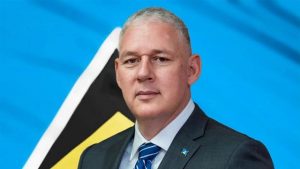CASTRIES, St Lucia (CMC) — St Lucia’s Prime Minister Allen Chastanet yesterday announced that the International Monetary Fund (IMF) will hold a conference call with regional countries tomorrow to discuss the economic impact of the coronavirus (COVID-19) that has killed more than 4,000 people globally and poses enomic problems for small island developing states.
In a statement to parliament on the island’s, as well as the region’s preparation and strategies for dealing with the virus for which there is no vaccine, Chastanet also disclosed that his Tourism Minister Dominic Fedee, who is also the chairman of the Barbados-based Caribbean Tourism Organisation (CTO), was meeting with the Caribbean Hotel Tourism Association (CHTA) under the supervision of The Bahamas, whose prime minister is the regional lead on tourism [and who] has been working for the last two weeks to put together a Caribbean Tourism Conference with the World Tourism Organization, World Travel and Tourism Council (WTTC), the FCCA and the airlines.
“The purpose is to have a one-day discussion specifically on tourism and the coronavirus fallout, as well as preserve the global confidence in Caribbean tourism,” Chastanet said, having earlier disclosed that the region had been holding discussions with cruise ship operators on protocol to guide their relationship in the COVID-19 era.
Chastanet said as his Administration prepares to present the 2020-21 national budget “we are also monitoring what is happening on the world stage.
“The economic fallout in the last couple of days in the global stock market, which is a result of the continued spread of coronavirus as well as the oil price war which has now erupted between Russia and Saudiž Arabia — this has created economic anxiety.
“Hence we are in dialogue with the central bank, the World Bank, the Caribbean Development Bank (CDB) and the IMF, on what measures and mechanisms we can put in place in order to maintain the confidence of the business community. A conference call with the IMF is scheduled with the region for Monday next week,” he told legislators.
Last week, the Washington-based financial institution said it would make available US$50 billion to help countries address COVID-19.
Chastanet said the G0vernment would “have to delay the budget presentation until we have a full picture of the economic implications, in order that our numbers can be adjusted to the new normal”.
He said the Ministry of Finance will present him with a report by today, “with possible ways we can support the tourism industry and the economy.
“I can report that we have run several different models in order to predict and prepare for the fallout, in particular with regard to tourism arrivals. We will not be caught off guard,” Chastanet said, disclosing earlier “we have had to make difficult decisions as it pertain to cruise ship calls to Port Castries.
“Over the last few weeks, in consultation with the cruise ship industry, we have denied entry of one ship and the re-routing of a few others.
“The preliminary calculations show that we have forgone approximately 18,721 cruise passengers coming to our shores. These are the difficult decisions we have had to make, but always in the best interest of our citizens.”
He told parliament that he wanted to assure all citizens that the priority is on the health sector, and in anticipation of what’s going to happen, “we are in parallel considering everything we can to give support to our economy.
“The good news is that the Government’s major capital investment programme – the airport, St Jude, the police headquarters, the road rehabilitation, our CDP projects, and improvements in our health care sector – will continue and will help to cushion some of the negative impacts.”
He said the Government has taken the approach of viewing the coronavirus situation as it would a hurricane, and has mobilised the National Emergency Management Advisory Committee.
“By treating the coronavirus as an impending hurricane, we are operating with the understanding that we have a potentially catastrophic event coming. Like a hurricane, there is uncertainty: it could hit us, or it may not hit us. When it is going to hit us and how strong it is going to be are all things that we cannot predict with any level of certainty.
“But, we have all learnt how unpredictable hurricanes have become since the advent of climate change. Similarly, there is a tremendous amount that we don’t know. Hence, like a hurricane, we must be prepared,” he added.

